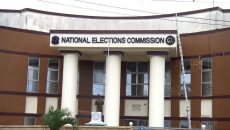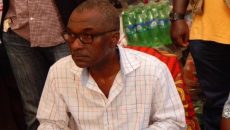MONROVIA, Montserrado – Despite being declared a wanted man by the Liberian National Police on Friday, March 19, Unity Party Secretary-General Mohammed Ali has not been charged with any crime. The case is drawing condemnations from opposition groups that the police decision was politically motivated.
The police invited Ali to clarify a Facebook post directed at the National Elections Commission on March 1.
“Dear National Elections Commission, we understand the ploy. But try it, and you will see what is gonna be the end result,” the statement read.
Although Ali has not yet explained his post’s context, the Collaborating Political Parties opposition bloc has been speaking tough on the National Elections Commission’s refusal to certificate its Lofa candidate, Brownie Samukai, winner of the December 8 Senatorial elections.
NEC previously announced that Samukai had won the election. The Ministry of Justice had asked the commission not to proceed with Samukai’s certification after the Supreme Court’s decision in a criminal case against the Lofa senator-elect. In its ruling, the court ordered that Samukai restitute close to US$1.2 million to the government for funds misappropriated during his time as defense minister under former president Ellen Johnson Sirleaf. Half of the amount was ordered to be paid in six months; failure to do so would see Samukai face jail time.
Neither the constitution nor the New Election Law prohibits a convict from contesting for or being inducted into the Senate. NEC’s regulations and guidelines for independent candidates and political parties, last updated in 2017, also do not bar anyone convicted of a crime from running. The candidate nomination regulations are also silent on the issue.
While the penal code does provide for an individual to be disqualified from public office for crimes such as treason and felonies in connection to employment as a public servant, it also empowers the court to disqualify the convict. In Samukai’s case, the request came from the Justice Ministry, not the judiciary.
NEC’s refusal to certificate Samukai has led to the claims by opposition members and observers that the commission is wading into politics and refusing to honor the wishes of the people of Lofa.
During the night hours of March 15, an arson attack by unknown assailants on NEC’s Sinkor headquarters left a pick-up truck inside the compound burnt. The damages, according to the commission, amounted to around US$45,000.
A few days earlier, on March 10, a similar petrol bomb attack was made against the home of Associate Justice Joseph Nagbe of the Supreme Court. The perpetrator of both acts remains at large.
However, without proof, the government alleges that the attacks resulted from Ali’s social media post, and the police invited him to clarify its ‘motive and intent.’
The police invited Ali via a text message for a conversation at its national headquarters on Capitol Hill. A group of lawyers representing his interest, headed by Cllr. Findley Karnga, wrote Police Inspector General Patrick Sudue to inform him that their client was not in good health and could not honor the invitation that day.
Karnga later told journalists that his letter also informed the police their Ali would appear later to honor the invitation.
However, hours later, on March 19, police spokesman Moses Carter held a press conference to inform the public that Unity Party’s secretary-general had refused to honor the police invitation. After his ‘refusal’ to appear for a ‘conversation’ despite two invitations, Carter declared Ali wanted by the state.
Ali’s lawyer, Karnga, said the action by the police endangered the security of his client. He encouraged the government to seek redress through the courts if it thinks his client committed any crime, rather than inviting him for a ‘conversation.’
Meanwhile, on Monday, Ali appeared at the police headquarters, escorted by his lawyers and officials of the Collaborating Political Parties. He was later released to his lawyers and asked to return within 48 hours as the police continue their investigation.
Present at the police headquarters were the political leaders of the CPP’s constituent parties: Joseph Boakai of Unity Party, Alexander Cummings of the Alternative National Congress, Sen. Nyonblee Karnga-Lawrence of Liberty Party, and Benoni Urey of the All Liberian Party.
Liberty Party’s chair, Musa Bility, who spoke on behalf of the CPP, said the police’s action to declare a senior member of the opposition bloc a wanted man is not based on any fact. He said the police are responsible for establishing the link between Ali’s post and the bombing at NEC’s headquarters and the home of the associate justice.
“I don’t see any sense in calling a person you have overwhelming evidence linking to bombing of Associate Justice Nagbe house to a conference, rather than issuing charges against them to face the law in court,” he said.
“It’s now time the police, who we are investing lots of money and resources in, start standing for public interest and stop giving themselves to be used for political motives against the suffering citizens.”
Meanwhile, Minister of State Nathaniel McGill has made a statement where he accused Bility and other opposition members of inciting the arson attack on the home of the associate justice. He encouraged the government to file charges against them instead of making accusations in the media.
Gbatemah Senah contributed to this article. Featured photo by Zeze Ballah



